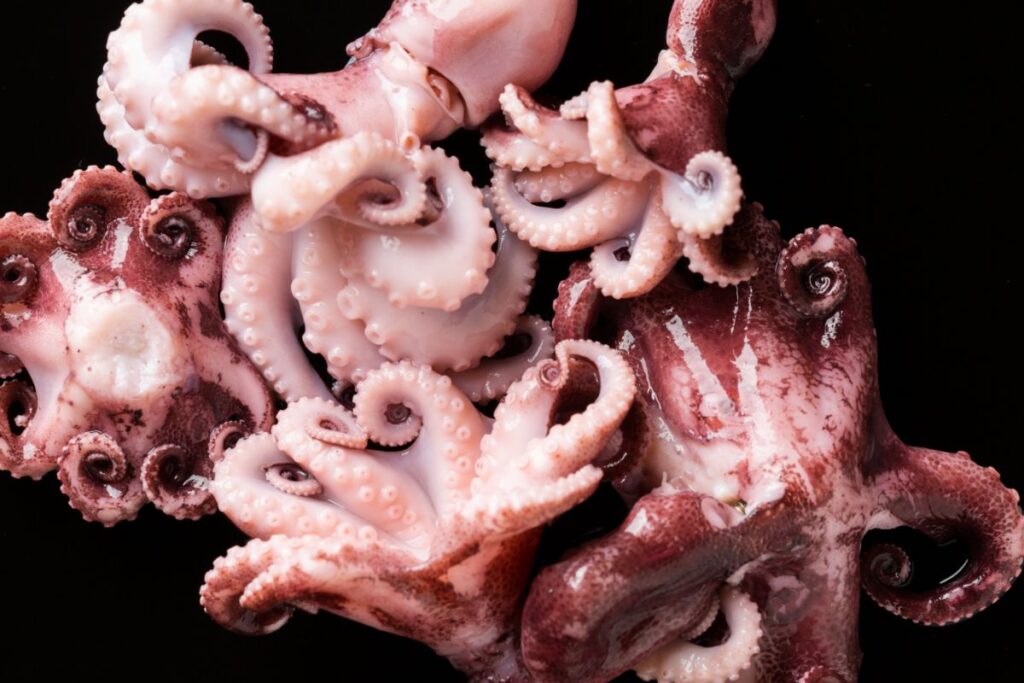Is octopus healthy? This question often arises as we seek to diversify our diets and explore new culinary experiences. While octopus might not be a staple in every kitchen, its nutritional profile and potential health benefits make it worthy of consideration. This thorough investigation digs into the different parts of octopus nourishment, its culinary flexibility, and its potential commitment to a reasonable eating routine.
Nutritional Profile of Octopus
Octopus is a nutrient-dense food with essential vitamins, minerals, and macronutrients. Here’s a breakdown of its nutritional profile per 100 grams:
- Calories: Approximately 82 kcal
- Protein: 14 grams
- Fat: 1 gram
- Carbohydrates: 2 grams
- Cholesterol: 48 mg
- Sodium: 230 mg
Octopus is also a rich source of vitamins and minerals, including:
- Vitamin B12 is essential for nerve capability, DNA, and red blood cell production.
- Vitamin B6: Significant for cerebrum wellbeing and digestion.
- Vitamin B3 (Niacin): Help convert food into energy.
- Iron: Fundamental for the development of red platelets.
- Copper: Supports iron retention and the development of collagen and energy creation.
- Phosphorus: Important for healthy bones and teeth.
- Selenium: A cancer prevention agent that shields cells from harm.
Health Benefits of Eating Octopus
High in Protein
Octopus is a great wellspring of top-notch protein, making it ideal for muscle building and repair. Protein is crucial for various bodily functions, including enzyme and hormone production, immune function, and the maintenance of healthy skin, hair, and nails.
Low in Fat
With about 1 gram of fat for every 100 grams, octopus is a low-fat food. Most of its fat content consists of healthy unsaturated fats, which benefit heart health. Counting low-fat protein sources like octopus can assist with controlling weight and lessen the risk of cardiovascular illnesses.
Rich in Omega-3 Fatty Acids
Octopus contains omega-3 fatty acids, known for their anti-inflammatory properties and benefits for heart health. Omega-3s help lower triglyceride levels, reduce blood pressure, and decrease the risk of arrhythmias. They are also essential for brain health and cognitive function.
Packed with Vitamins and Minerals
The high vitamin and mineral content in octopus offers numerous health benefits:
- Vitamin B12: Supports nerve health and cognitive function and helps prevent megaloblastic anemia.
- Iron: Fundamental for oxygen transport in the blood and forestalling iron-lack sickliness.
- Copper: Plays a role in cardiovascular health and the immune system.
- Selenium: Has cancer prevention agent properties that safeguard cells from harm and backing the invulnerable framework.
Antioxidant Properties
Selenium in octopus is a cancer prevention agent, assisting with killing destructive free radicals in the body. This can decrease oxidative pressure and irritation, which are connected to various chronic illnesses, including malignant growth and coronary illness.
Promotes Metabolic Health
Vitamins B3 and B6 in octopuses play significant roles in metabolism. Vitamin B3 help convert food into energy and supports the soundness of the stomach-related framework, skin, and nerves. Vitamin B6 involves amino acid metabolism, neurotransmitter synthesis, and gene expression.
Potential Concerns and Considerations
While octopus has numerous health benefits, there are some considerations to keep in mind:
Cholesterol Content
Octopus contains cholesterol (about 48 mg per 100 grams). While dietary cholesterol does not affect blood cholesterol levels for most people, those with specific health conditions, such as familial hypercholesterolemia or certain types of heart disease, should monitor their intake.
Sodium Levels
Octopus has a moderate sodium content (230 mg per 100 grams), which can contribute to increased blood pressure if consumed in large amounts. It’s essential to balance sodium intake by avoiding excessively salty foods and choosing fresh or lightly seasoned preparations of octopus.
Potential Allergies
Seafood allergies, including mollusks like octopus, can be severe. Symptoms may include hives, swelling, digestive issues, and anaphylaxis. If you have a known seafood allergy, avoiding octopus and seeking medical advice if you experience any adverse reactions is crucial.
How to Include Octopus in Your Diet?
Octopus can be a versatile addition to your diet, suitable for various culinary traditions and cooking methods. Here are some tips on how to prepare and enjoy octopus:
Grilled Octopus
Barbecuing is a well-known strategy that draws out the normal kinds of octopus. Marinate the octopus in olive oil, lemon juice, garlic, and spices, then, at that point, barbecue until delicate and marginally scorched. Present a new serving of mixed greens or cooked vegetables for a good dinner.
Octopus Salad
For a light and refreshing dish, try an octopus salad. Boil the octopus until tender, then slice and toss with mixed greens, cherry tomatoes, cucumbers, red onions, and a vinaigrette dressing. For a Mediterranean twist, add olives and feta cheese.
Takoyaki
Takoyaki is a Japanese food from batter filled with diced octopus, tempura scraps, pickled ginger, and green onions. Cooked in a special pan, these savory balls are crispy on the outside and soft on the inside. Top with Takoyaki sauce, mayonnaise, and bonito flakes.
Octopus Stew
A hearty octopus stew can be a comforting and nutritious meal. Cook octopus with tomatoes, onions, garlic, bell peppers, and spices in a rich broth. Add potatoes or beans for extra sustenance and serve with crusty bread.
Sushi and Sashimi
Octopus is often used in sushi and sashimi. Its firm surface and mild flavor make it a popular choice. Try Tako Nigiri (octopus sushi) or Tako Sashimi, frequently presented with soy sauce, wasabi, and cured ginger.
Sustainable Sourcing and Ethical Considerations
While adding octopus to your eating regimen, taking into account the supportability and moral ramifications of fish consumption is significant. Overfishing and disastrous fishing practices can hurt marine environments. Look for octopus sourced from sustainable fisheries that follow responsible fishing practices. The Monterey Bay Aquarium’s Seafood Watch program is a good resource for finding sustainable seafood options.
Protein Quality
One of the key benefits of octopus is the quality of its protein. Is octopus healthy for meeting your protein needs? Absolutely. Octopus protein is bountiful and of superior grade, containing all the crucial amino acids essential for muscle fix, insusceptible capability, and general well-being. Incorporating octopus into your diet can help diversify your protein sources and ensure you’re getting a well-rounded amino acid profile.
Vitamins and Minerals
Octopus is rich in protein and omega-3s and packed with essential vitamins and minerals. Is octopus healthy for meeting your micronutrient needs? Absolutely. It contains significant amounts of vitamin B12, critical for nerve function and DNA synthesis, and vitamins A, C, and several B vitamins. Additionally, octopus is a good source of minerals such as iron, zinc, copper, and selenium, which play vital roles in different functions, including immune support and antioxidant defense.
Low Calorie and Fat Content
For those watching their calorie and fat admission, octopus is a superb choice. Is octopus good for weighing the board? Positively, with 140 calories and 2 grams of fat for each 3-ounce serving, octopus gives a filling and fulfilling dinner without stressing over unreasonable calories or fat utilization. Its low-calorie thickness makes it an incredible decision for those hoping to keep up with or get thinner while as yet appreciating delectable and nutritious fish.
Culinary Versatility
Is octopus healthy, and is it versatile in the kitchen? Absolutely. Octopus loans itself well to different cooking strategies, including barbecuing, bubbling, broiling, and even sous vide. Its firm surface and gentle flavor make it versatile for various cooking styles and culinary procedures. Whether you prefer it marinated and grilled to perfection, added to hearty stews and soups, or served as a sushi delicacy, octopus offers endless possibilities for culinary creativity.
Sustainability Considerations
When discussing the health benefits of octopus, it’s essential to consider sustainability. Is octopus healthy for the planet? While octopus itself is nutritious, sustainable sourcing practices are crucial to ensure its long-term viability as a food source. Responsible fishing methods and aquaculture practices help mitigate the environmental impact of octopus harvesting and support the health of marine ecosystems. By choosing sustainably sourced octopus, consumers can enjoy its nutritional benefits while promoting environmental conservation.
Potential Health Benefits
Beyond its nutritional value, octopus may offer several potential health benefits. Is octopus healthy for preventing certain health conditions? While research is continuous, a few studies propose that the omega-3 unsaturated fats found in octopus might assist with decreasing the risk of coronary illness, improving mental capability, and easing side effects of fiery circumstances like joint pain. Furthermore, the high protein content of octopus can support muscle development and repair it, making it a superb decision for competitors and wellness specialists.
Incorporating Octopus into Your Diet
Now that we’ve answered the question, “Is octopus healthy?” let’s explore how you can incorporate this nutritious seafood into your diet. From simple grilled octopus salads to complex seafood paellas, there are countless ways to enjoy octopus dishes at home or in restaurants. Experiment with different flavors, spices, and cooking techniques to discover your favorite octopus recipes and reap the benefits of this unique and flavorful ingredient.
Conclusion
Incorporating octopus into your diet can offer various health benefits, from high-quality protein and low-fat content to essential vitamins and minerals. Its rich nutritional profile supports muscle building, heart health, and metabolic function, while its antioxidant properties help protect against chronic diseases. However, it’s important to be mindful of potential concerns like cholesterol, sodium content, and allergies.
By choosing sustainable sources and experimenting with different cooking methods, you can enjoy the culinary delights of octopus while reaping its health benefits. Whether barbecued, in a plate of mixed greens, as a stew component, or in sushi, the octopus can be a delicious and nutritious expansion to a fair eating routine.








